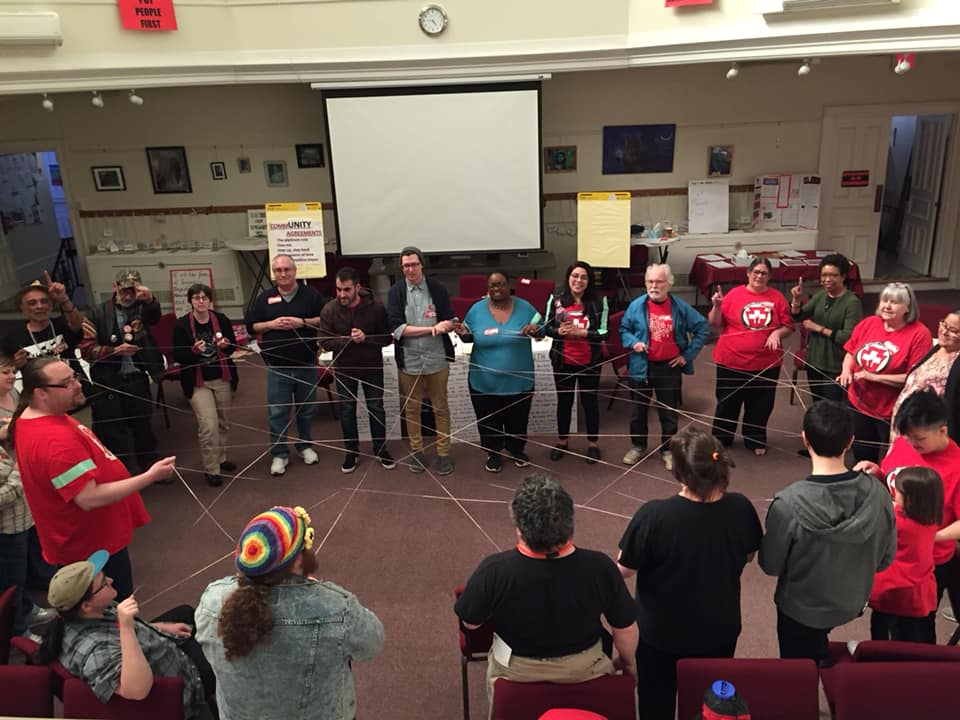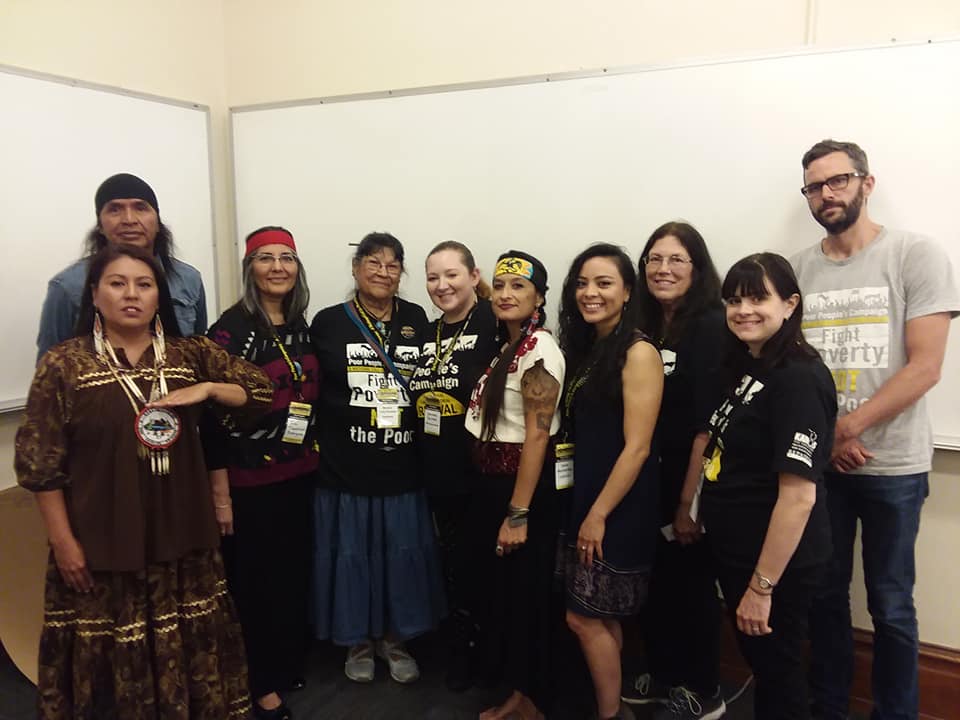Within Put People First! PA, singing is a growing practice of our organization that deepens our collectivity and solidarity with one another. As we struggle together to end the systems of oppression that we live under, we are creating a collective identity of our class that is rooted in the struggle, and as with all identities, a culture that will reflect it. It warrants our study and attention to think and be intentional about the art and the music that colors this culture as much as the norms and practices we’re making a part of it. And as we draw on a long history of lessons and experiences from the struggles of poor folk who have come before us, we too have a long history of music and art to look back on.
I’ve had the good fortune to sing ‘Which Side Are You On’ quite a few times now. Probably the most memorable was during the 40 Days of Action, in 2018 on the relaunch of the PPC:NCMR. We chose it for our moral-fusion direct action during the 5th week, focused on the ‘Everybody’s Got A Right To Live,’ week – the right to unionize, to living wage jobs, income and housing. We had to sing for almost forty minutes, thundering through the gaudy halls of the state capitol building, as the cops were hesitant to make arrests that week. But as we hollered on and on, drowning out any other noise, the line of division between us and them became clearer and clearer. As Florence Reese herself said on many occasions, the gun-thugs and scabs were workers too – and they knew damned well which side they chose.
Florence understood that there was a war on workers, a war on the poor – she saw it firsthand in the hollars of Harlan County, Kentucky. Her husband was a coal miner, Sam Reece – a good union man and a lead organizer throughout his life, and her father and grandfather had both been coal miners. They knew firsthand the horrors of the company bosses, the mines, and the poverty that was forced upon them. From 1931-1939, through the Depression, Harlan County erupted in violence as the United Mine Workers came to assist the miners in their struggle when the company bosses cut their wages. At the height, almost 6,000 men idled on strike, with barely a thousand scabbing – but hundreds of outside gun-thugs were hired on by the company to protect them, each deputized by Sheriff J.H. Blair – who informed them to act with impunity to harass, beat and terrorize the striking men and their families.
Just as the UMW was setting in, in 1931, Sam stepped up to be one of the first major local organizers. The company ordered J.H. Blair himself, along with a number of deputies to raid Sam’s home and have him killed or beaten so badly he wished he had been. Thankfully, Sam was warned ahead of time, but Florence and their children were at home unawares when Blair and his men broke down the door and ransacked the house, striking her and terrorizing the children.
When they left, she went inside and found the calendar they had ripped down off the wall, on which she wrote the titular song. Sam may have lived, but many other men died in confrontations with the gun-thugs and J.H. Blair, including Harry Simms. After the National Guard was called in, which broke up the long-standing strike and killed dozens of men, the UMW abandoned Harlan county and the National Miner’s Union (the NMU, here out) moved in. Openly a part of the Young Communist League, they revitalized the strikes and established robust soup kitchens and aid programs to sustain the strikers. Harry Simms was only twenty years old when a deputy murdered him in broad daylight. The clergy in the hollar turned on the strikers too, denouncing the NMU as anti-religious communists and the Red Cross, which at this point had been neutral in the affair, began to exclusively provide aid to the scabs.
The song survived the strikes and the war in Harlan County, as did the Reeces. Florence would end up traveling and singing as a poet and folksinger, recounting the lessons from the strike and highlighting that there is no such thing as neutral in the war between workers and capital.
“My songs always goes to the underdog – to the worker. I’m one of them and I feel like I’ve got to be with them. There’s no such thing as neutral. You have to be on one side or the other. Some people say, ‘I don’t take sides – I’m neutral.’ There’s no such thing. In your mind you’re on one side or the other. In Harlan County there wasn’t no neutral. If you wasn’t a gun thug, you was a union man. You had to be.” -Florence Reese.
The song has gone through what is colloquially called the “folk process,” – a fancy way of saying that folks forgot some of the words after learning it and just wrote up their own verses. If you dig hard enough, you can find all sorts added to it. It’s been made into death metal, jazz and everything in between. Here’s the words that I fiddled with, which frankly I changed to make it focused less on being about chiding the men into being brave, and more about our class. Learn it and sing out, friends!
Which Side Are You On?
Chorus – repeat after verses
Which side are you on, ooh?
Which side are you on? (repeat both lines)Come all of you good workers
Good news to you I’ll tell
Of how the good old union
Has come in here to dwell.Oh workers can you stand it?
Oh tell me how you can?
Will you be a lousy scab
Or will you take a stand?My momma was a worker
She’s in the clouds & air
And when I’m with the union
I know that she is thereMy daddy was a miner,
And I’m a miner’s child,
And I’ll be with the union
While out enemies run wild!They say in Harlan County
There are no neutrals there.
You’ll either be in the union
Or a thug for J.H BlairDon’t listen to the bosses
Don’t listen to their lives!
Us poor folk don’t have a chance
Unless we organize!
*****************************
This content originally appeared in Put People First! PA’s semi-annual newsletter, The Keystone. The Keystone is a great introduction to Put People First! PA, our work, and our community. It’s all written by our members for our own communication and education, and for supporters and new relationships to get to know us better. Each issue features reports from our work, news about our victories, stories about the health care system and the other issues affecting our communities, and poetry and artwork. Check out past and present editions here: Newsletter Archive.

